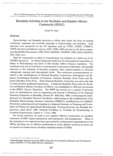Biosafety Activities in the Southern and Eastern African Community (SEAC)
JIRCAS international symposium series
| ISSN | 13406108 |
|---|---|
| 書誌レコードID(総合目録DB) | AA1100908X |

本文フルテキスト
intlsymp-5_257-268.pdf350.41 KB
Biotechnology and Biosafety activities in Africa have taken the form of training workshops, symposia and scientific meetings in biotechnology and biosafety. Such activities were sponsored by the UN Agencies, such as UNEP, UNIDO, UNESCO, UNDP and their subsidiaries such as, ICSU, IUBS, ABN and also by the donor community (Rockefeller Foundation, GTZ, DGIS, SAGENE, COGENE, CIDA, SIDA, DANIDA, CSC, ODA, etc.).
Need for cooperation in safety in biotechnology was initiated as a follow-up of the UNCED Agenda 21. An African Regional Conference for International Cooperation on Safety in Biotechnology was held 11-14th October 1993 in Harare, Zimbabwe. The conference aim was to contribute to international cooperation in Biosafety, with specific attention to the initiation of biosafety programs, their implementation at National subregional, regional and international levels. The conference recommendations resulted in the establishment of National Biosafety Committees, Subregional and Regional Coordinating Biosafety Committees, National Biosafety Focal Points and Regional Biosafety Focal Point. Each National Biosafety Committee was given the task to draft biosafety guidelines/regulations. A Regional Biosafety Focal point for Southern and Eastern African Countries (13 SEAC), was established in 1993 and was housed at the SIRDC, Harare, Zimbabwe. The RBFP has carried out a number of activities since its establishment such as organizing and hosting A Workshop of the Regional Standing Committee on Biosafety, Harare 29 - 30th May, 1995, coordinating the establishment of a Biosafety Network Newsletter, collaborating in the establishment of the Zimbabwe Biotechnology Advisory Committee (ZIMBAC), establishment of a ZIMBAC Newsletter, planning and participating in a Regional Seminar on Planning and Formulation of Policies for Agricultural Biotechnology: Turning Priorities into Feasible Programmes, April 23-27, 1995, National Workshop on Priorities for Biotechnology in Livestock Improvement, Harare 5 - 7 June, 1995.
For future direction, we need to put together effective mechanisms on biosafety evaluation of GMP, impact assessment, risk assessment, risk management. Many of the countries in our region have been approached by multinational organizations to test GMOs, but there are no effective mechanisms to make effective decisions as there are no experts on release issues including contained release of GMOs.
Need for cooperation in safety in biotechnology was initiated as a follow-up of the UNCED Agenda 21. An African Regional Conference for International Cooperation on Safety in Biotechnology was held 11-14th October 1993 in Harare, Zimbabwe. The conference aim was to contribute to international cooperation in Biosafety, with specific attention to the initiation of biosafety programs, their implementation at National subregional, regional and international levels. The conference recommendations resulted in the establishment of National Biosafety Committees, Subregional and Regional Coordinating Biosafety Committees, National Biosafety Focal Points and Regional Biosafety Focal Point. Each National Biosafety Committee was given the task to draft biosafety guidelines/regulations. A Regional Biosafety Focal point for Southern and Eastern African Countries (13 SEAC), was established in 1993 and was housed at the SIRDC, Harare, Zimbabwe. The RBFP has carried out a number of activities since its establishment such as organizing and hosting A Workshop of the Regional Standing Committee on Biosafety, Harare 29 - 30th May, 1995, coordinating the establishment of a Biosafety Network Newsletter, collaborating in the establishment of the Zimbabwe Biotechnology Advisory Committee (ZIMBAC), establishment of a ZIMBAC Newsletter, planning and participating in a Regional Seminar on Planning and Formulation of Policies for Agricultural Biotechnology: Turning Priorities into Feasible Programmes, April 23-27, 1995, National Workshop on Priorities for Biotechnology in Livestock Improvement, Harare 5 - 7 June, 1995.
For future direction, we need to put together effective mechanisms on biosafety evaluation of GMP, impact assessment, risk assessment, risk management. Many of the countries in our region have been approached by multinational organizations to test GMOs, but there are no effective mechanisms to make effective decisions as there are no experts on release issues including contained release of GMOs.
| 作成者 | Joseph M. Gopo |
|---|---|
| 公開者 | Japan International Research Center for Agricultural Sciences |
| オンライン掲載日 | |
| 号 | 5 |
| 開始ページ | 257 |
| 終了ページ | 268 |
| 言語 | eng |
